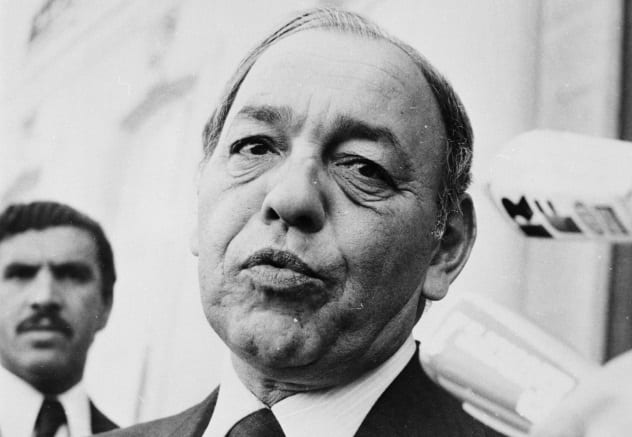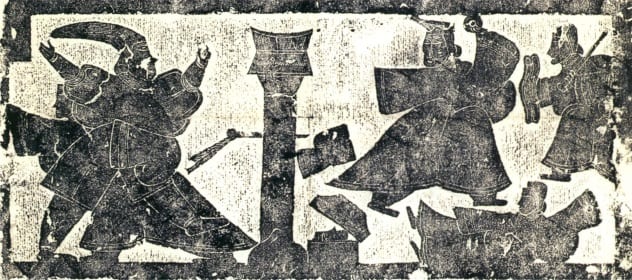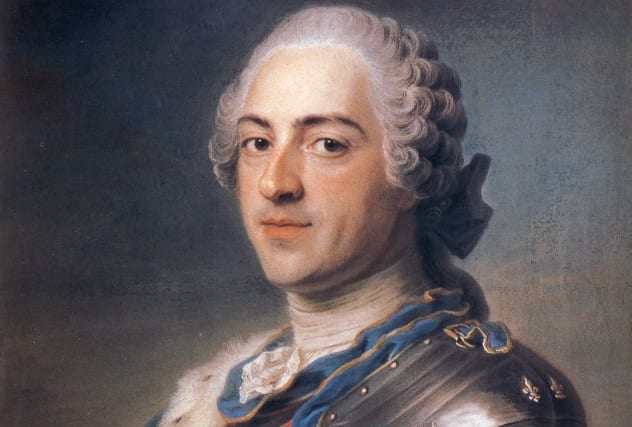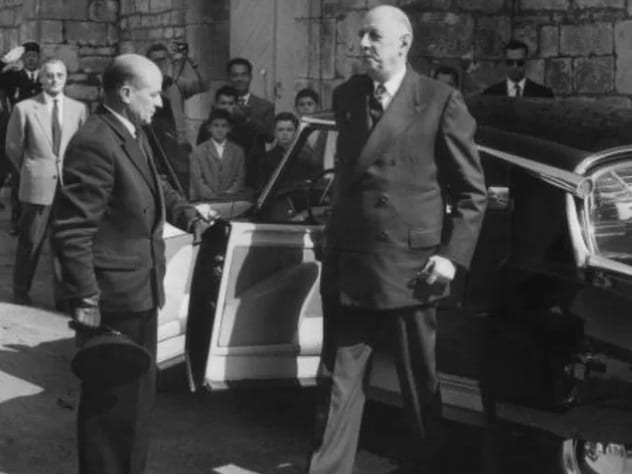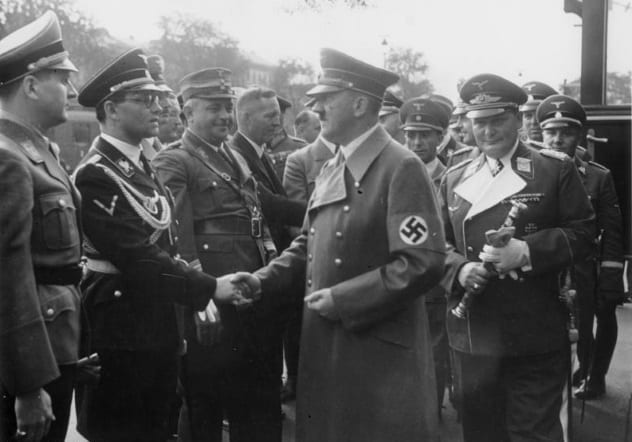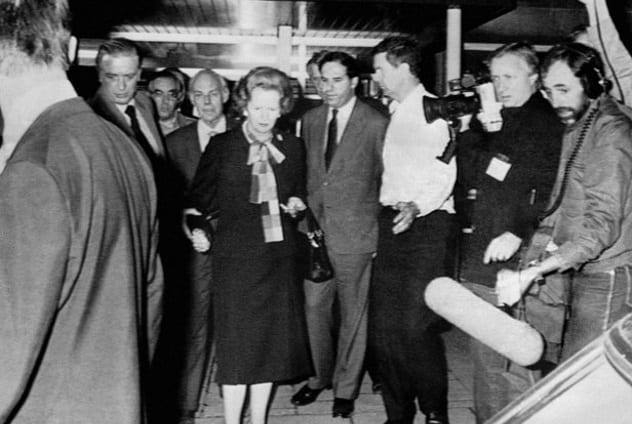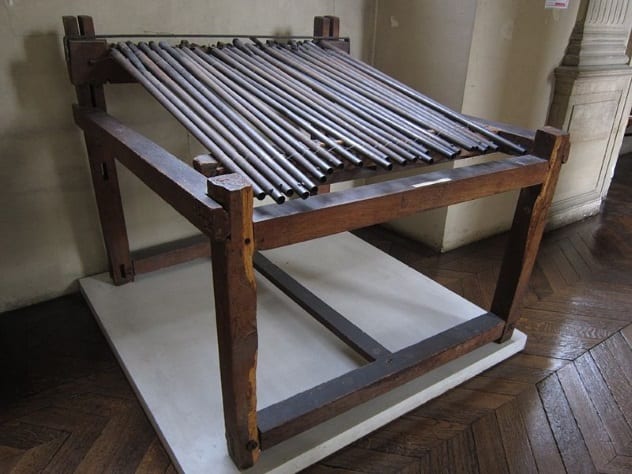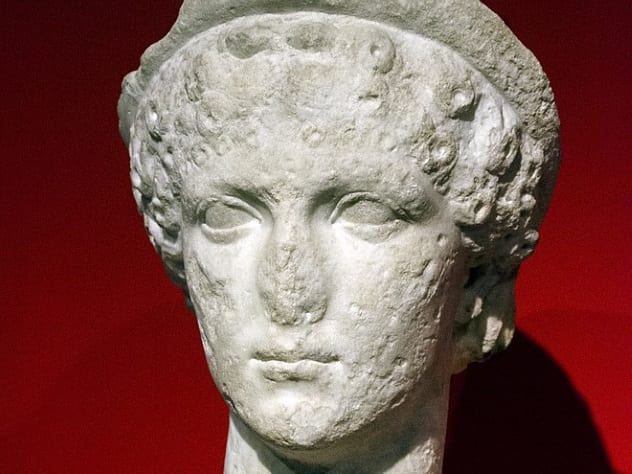For instance, the king of Morocco once escaped assassination after ordering his attackers to stop shooting at him because he was dead. However, as we are about to find out, he was not alone. Here are ten crazy ways people avoided being assassinated.
10 King Hassan II Ordered His Attackers To Stop Firing Because He Was Dead
King Hassan II became the ruler of Morocco on February 26, 1961. He was not very popular at the beginning of his kingship. In fact, there were suggestions that he would not last six months on the throne. He definitely disappointed his critics when he went on to rule for 38 years. However, dissident Moroccan military officers didn’t just sit around waiting for the king’s death. They launched several attempted coups to kill him. One such attempt happened on July 10, 1971, when some 2,000 rebellious soldiers invaded King Hassan’s palace during his 42nd birthday party and opened fire on the guests. At least 100 people were killed, but none of them was King Hassan. Hassan is said to have approached the leader of the coup and looked at him straight in the eye while reciting verses of the Quran. The coup leader lost his nerves and could not shoot the king. Another coup attempt followed a year later. On August 16, 1972, Hassan was flying from Paris to Morocco when his airplane was intercepted by four Royal Moroccan Air Force F-5 fighters as he approached Rabat airport. Hassan was a trained pilot and was in the cockpit at the time of the attack. The rebellious pilots fired at the king’s airplane, damaging several parts, including the engine. However, Hassan pretended he was a regular pilot when he grabbed the radio and screamed, “Stop firing! The tyrant is dead!” The F-5s then broke off, thinking they had killed the king. Hassan’s airplane landed, and he had the coup plotters arrested.[1]
9 Poor Bomb Placement Saved The Saudi Prince
Abdullah and Ibrahim al-Asiri are brothers declared wanted by Saudi authorities for terrorism. Both brothers were members of Al-Qaeda in the Arabian Peninsula (AQAP). The group was formed after the local Al-Qaeda factions in Saudi Arabia and Yemen merged in January 2009. AQAP’s first operation was the assassination of Nayef Bin Abdul-Aziz Al Saud, a one-time crown prince of Saudi Arabia. Prince Nayef was responsible for Saudi Arabia’s security at the time of the attempted assassination. Abdullah informed the prince about his intention to denounce terrorism and offered to meet him in person. The prince was open to the meeting. In fact, he even had Abdullah flown into Jeddah on his private jet. However, the prince never realized that the surrender was a ruse. Abdullah had a bomb inside his anus or his underwear and planned to detonate it when he got close enough to the prince. He did just that when he got within range. Fortunately, Abdullah was the only casualty since the force of the explosion went downward. Abdullah was blown in half, but the prince only sustained minor injuries.[2]
8 Qin Shi Huang Ran Around A Pillar To Escape An Assassin
Emperor Qin Shi Huang ruled China between 220 and 210 BC. He defeated and unified the six warring Chinese states and made himself emperor. He also gave China its name and kicked off construction of the Great Wall of China. Qin Shi Huang made some real enemies during his conquest of the warring Chinese states. One of his greatest enemies was the crown prince of Yan (one of the warring states), who he held hostage. The prince escaped and returned to Yan, where he was joined by General Fan. General Fan was one of Qin Shi Huang’s commanders but had fled to Yan after falling out of favor with the emperor. The emperor already killed Yan’s family and was very interested in seeing him dead. The prince feared Qin Shi Huang could start a war with Yan just to get the general, so he ordered the assassination of the emperor. The assassin was Jing Ke. However, Jing needed a good reason to get close to Qin Shi Huang. So he met with General Fan and asked that he gave him his head so that he could present it to the emperor. General Fan agreed and committed suicide. Jing and an assistant later delivered the general’s head and a box of maps to Qin Shi Huang. The emperor was impressed with the gifts. His joy turned to horror when Jing held him by the sleeves and revealed a poisoned dagger hidden in the maps. Jing did not slaughter the emperor as planned but tried negotiating a peace deal. However, the nfrightened emperor fled before Jing could talk, and Jing followed in pursuit. No soldier challenged Jing because of the policy of keeping weapons away from the emperor. The emperor could not draw his sword, either, because his robes were too large. So the entire court watched in disbelief as the emperor ran around a pillar and Jing followed behind with his dagger. The duo continued running around the pillar until Qin Shi Huang’s doctor threw a medicine bag at Jing. The distraction gave Qin Shi Huang enough time to draw his sword, which he used to cut Jing at the thigh. The undeterred Jing threw the poisoned dagger at the emperor but missed. The bloodied Jing told Qin Shi Huang, “I failed because I tried to threaten you without killing you!” before the emperor’s gaurds killed him.[3]
7 Thick Winter Clothing Saved King Louis XV
On January 5, 1757, Robert-Francois Damiens tried to assassinate King Louis XV of France with a knife. Louis XV was unpopular at the time, and there were lots of people interested in seeing him dead. The king remained indoors most of the time but had visited his sick daughter, Madame Victoire, at the time he was attacked. Louis XV was returning to his palace when Damiens stabbed him in the side with a knife. The king started bleeding and feared he was dying. Upon his return to his bedroom, he confessed his infidelity to his queen. He asked for forgiveness and promised to confess to more acts of infidelity if he survived. King Louis survived the assassination attempt because the injury was small and nonlethal. Apparently, the day was cold, and he had worn thick winter clothing. Most of the knife got stuck in the thick clothing, and only a small part of the tip managed to pierce his body, causing the small wound.[4]
6 Charles De Gaulle Survived Because Of His Car’s Suspension
Sometimes, a good car is all you need to survive an assassination. Ask Charles de Gaulle, who was elected president of France in 1958. In August 1962, de Gaulle had drawn the ire of the paramilitary group OAS after granting independence to Algeria. Algeria had been involved in a deadly war of independence against France, forcing de Gaulle to give in to their demands. However, the OAS wanted Algeria to remain a territory of France. Twelve OAS personnel opened fire on de Gaulle’s vehicle as he was being driven from Elysee palace to Orly airport. The men fired 140 rounds at the vehicle, a Citroen DS. However, the president survived because the car had an excellent suspension. The Citroen DS was an incredible piece of engineering for its time and even today. Today’s vehicles use springs for suspension. The Citroen DS used a fully independent hydropneumatic suspension. This allowed the car to always remain level, irrespective of its position relative to the road or its wheels. Depending on the accounts, the heavy gunfire destroyed between two and four tires. Whatever the case, the car remained level, allowing the driver to escape despite the blown-out tires. Unfortunately, two of de Gaulle’s bodyguards were killed in the attack.[5]
5 Nazi Salute Saves Hitler From Gunshot
There were many assassination attempts on Adolf Hitler, and every one of them failed. One attempt occurred in 1938, when a man called Maurice Bavaud tried to shoot Hitler during a rally in Nuremberg. Bavaud stood on an overpass with other spectators, hoping to shoot Hitler when he passed. However, the plan failed when other spectators gave the Nazi salute as Hitler passed. Their hands obstructed Bavaud’s view, preventing him from aiming his weapon at Hitler. The undeterred Bavaud took a train to Berchtesgaden, where he knew Hitler was going after the rally. Then he heard Hitler was still in Munich. He took another train to Munich, where he was informed that Hitler was now heading for Berchtesgaden. Bavaud remained at the train station because he had no money left. His plot was revealed after police arrested him for vagrancy. Police found a gun, a letter to Hitler, and a forged letter of introduction in Bavaud’s possession. He was sentenced to death and guillotined in 1941.[6]
4 Assassination Attempt Ends After The Target Relocates
Apartheid was a tough time for black South Africans. Anti-apartheid movements like Nelson Mandela’s African National Congress sprang up to challenge the authority of the white government. The government responded by ordering the Civil Co-operation Bureau (CCB) to assassinate members of these anti-apartheid groups. Between 1986 and 1987, the CCB decided to assassinate Dr. Pallo Jordan and Ronnie Kasrils of the African National Congress. Since both men lived in London, the CCB decided to kill them with a Bulgarian umbrella: a type of umbrella that has been modified to fire poison darts from its tip. The assassin was Trevor Floyd. Floyd flew to Britain, where he met one Jan Lourens, who was supposed to teach him how to use the weapon. Trouble started when some of the poison spilled on Lourens. Lourens soon recovered, and Floyd left for London with the umbrella. Floyd later realized that the umbrella was too long, and the dart tip could get damaged if it touched the floor. So he used some tongs to cover the tip. However, the plot failed because Dr. Jordan had relocated from London. Kasrils was in London but was never where Floyd expected to find him. Floyd threw the umbrella into the River Thames.[7]
3 Margaret Thatcher Escaped Assassination Because She Worked Late
We once wrote about the p. Tyr362HIS gene that make some humans require less sleep than others. The gene is also called the Thatcher gene after British prime minister Margaret Thatcher, who frequently worked late into the night. It seems that gene once saved her from an assassination attempt. On October 12, 1984, a 9-kilogram (20 lb) bomb ripped through the Grand Hotel in Brighton, where Thatcher and other members of her Conservative Party were having a conference. The bomb was planted by members of the Irish Republic Army (IRA) after several IRA prisoners in British prisons had starved themselves to death. The bomb was placed in the hotel weeks earlier by Patrick Magee and a female IRA member. They set the bomb to explode at 2:53 AM 24 days later, when they expected members of the Conservative Party to lodge at the hotel for a conference. Thatcher was in her suite’s sitting room with her private secretary when the bomb exploded. The blast hit the bathroom and bedroom but not the sitting room. However, other rooms in the hotel fared worse. Five people were killed, and 34 others were injured in the explosion.[8]
2 An Assassination Attempt Failed Because The Assassins Were Idiots
In July 1835, Giuseppe Marco Fieschi tried to assassinate the French king, Louis Philippe. Fieschi was frustrated with life and had chosen to murder the king to settle his grievance with himself. Fieschi planned the assassination with two other men, named Morey and Pepin. The trio built an elaborate gun they called the infernal machine. The gun was actually more than 20 guns merged into a single unit. They fired the device on July 28, 1835, as King Louis Philippe, his three sons, and staff rode by. A ball missed King Louis Philippe’s head. However, his horse and the horses of two other people, including a prince, were hit. Eighteen people were killed, and several more were wounded. Fieschi himself was seriously injured by his weapon. The king and princes survived. Fieschi received excellent medical care, which was surprising to him. This made him think the crown would spare his life if he exposed his accomplices, so he gladly implicated Morey and Pepin at trial. Fieschi realized we was wrong, though, when he, Morey, and Pepin received death sentences. A fourth accomplice received 20 years in prison, and a fifth was acquitted.[9]
1 Nero’s Attempt To Kill His Mother Failed After She Swam Ashore
Roman emperor Nero had a troubled relationship with his mother, Agrippina. Agrippina wanted to control Nero’s government—something Nero disapproved of. When Nero protested, she started telling everyone who cared to listen that Nero was homosexual. At another time, she supported Nero’s wife, Octavia, during a fight over Nero’s infidelity. Nero had finally had enough and decided to get rid of his mother once and for all. First, Nero tampered with the ceiling above Agrippina’s bed so that it would collapse on her while she slept. The plot failed. Nero later sent Agrippina away from the palace. However, he later gifted her a party boat as an apology. In truth, the boat was rigged with a weight that would cause it to sink when it was out at sea. When the weight was deployed, however, Agrippina swam to shore.[10] After this failure, Nero had his mother killed the old-fashioned way: He sent assassins to stab Agrippina to death. Nero blamed Agermus, Agrippina’s bodyguard, for her assassination and had him executed.
